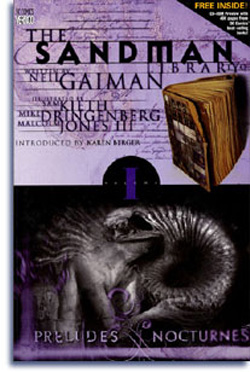WAITING
FOR TOMMY: BRYAN TALBOT
By
Richard Johnston RICH:
But the comics industry seems to rely on familiarity with
the same. Jim Lee only tops the industry sales when he does
Batman - his own Divine Right series scraped along the bottom.
Warren Ellis says he's felt the pressure to just do Batman
or some such. Do you feel any similar pressure, despite your
own feelings?
BRYAN:
Nope. I often get asked in interviews which superhero comics
I'd like a crack at. I don't really want to do any established
characters. I prefer to write my own stories.
RICH:
It's argued that the comics industry is unable to support
much of the art it produces. We've heard your difficulties
for getting Alice In Sunderland published. Why do you believe
publishers are unwilling to support such a work?
BRYAN:
Most comic companies are pretty timid with the direct sale
market as it is at the moment and unwilling to take chances
on something as off-the-wall in comic book store terms as
ALICE (even though it's potentially the most mass-market project
I've worked on) and mainstream book publishers are still jittery
about producing graphic novels at all, even though it's an
expanding market. Two big name mainstream publishers turned
it down, even though they were both very keen on it themselves,
after meetings with their "sales people". One bunch of these
suits wasn't sure it would sell sufficiently, while the other
(of the "Art House Publisher") thought it was too commercial!
I can't see the point of being a publisher if you can't go
with your own intuition and publish what you like without
it being okayed by your gaggle of market analysts. I'd been
talking with one of these publishers for about 8 months when
you ran the article on ALICE looking for a home. After that
I had 8 publishers who immediately contacted me about it.
RICH:
Well, it's not unknown for commerce to dictate art. How much
does the former influence the latter in your own work, rather
than a publisher's decision?
BRYAN:
Not at all. I either think I have a good story idea or I don't.
I only come up with these now and again - don't like doing
something that I think is too close to something that's been
done before, unless it's a rare commissioned thing, like the
Teknophage/Shadowdeath miniseries.
Big publishers
now seemed to be ruled by their money men. In the 50s when
Allen and Unwin were approached by Tolkien, the publisher
didn't think it would sell but loved it. He got onto his accountants
to ask them exactly how much he could afford to lose by publishing
it, to decide on the print run. That's a REAL publisher!
Pages:
1 | 2
| 3 | 4
| 5 Continued
Here... |







